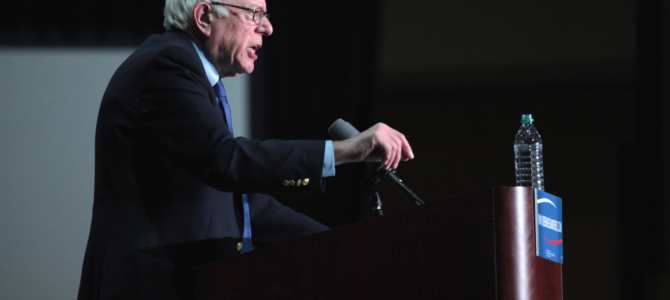
Sen. Bernie Sanders has always wanted to have it both ways regarding his position on Israel.
On the one hand, he has always made it clear he supports Israel’s right to exist even though that has caused him trouble with some of his far-left supporters who endorse the efforts of terrorist groups such as Hamas to destroy it.
On the other hand, Sanders has consistently gone out of his way to oppose Israel’s self-defense measures against terrorism, wildly exaggerate Palestinian casualties, call for the end of the international blockade of the terrorist-governed Gaza Strip, and even advocate diverting to Hamas-run Gaza some of the military aid the United States gives Israel.
In a field of Democratic presidential candidates who all oppose President Donald Trump’s efforts to bolster the U.S. alliance with Israel and his decision to withdraw from the Iran nuclear deal, Sanders is the least sympathetic to the Jewish state and the angriest critic of Prime Minister Benjamin Netanyahu, whom he has smeared as a racist.
Sanders Denounces AIPAC
But Sanders broke new ground this week when he not only declared he would not attend the annual policy conference of the pro-Israel lobby AIPAC but denounced the group as providing a platform for bigotry. The decision was hardly a surprise. In his nearly 30 years in Congress, Sanders has never once attended an AIPAC conference, something routine for the vast majority of House and Senate members from both parties.
In doing so, Sanders escalated his differences with the mainstream pro-Israel community. More to the point, he signaled both to his left-wing base and Democratic primary voters that if elected, he wouldn’t merely reinstate the antagonism between the United States and Israel that was a hallmark of the last Democratic administration when President Barack Obama advocated for more “daylight” between the two nations. By declaring war on AIPAC and attempting to brand it as not merely tainted by prejudice but beyond the pale for a Democrat, Sanders made clear that the alliance is in big trouble if he succeeds in winning his party’s nomination and beats Trump in November.
AIPAC responded to Sanders’s riposte by trumpeting its bipartisan credentials, tweeting a video featuring praise for the group from an array of leading politicians from both parties, including Obama, House Speaker Nancy Pelosi, and Senate Minority Leader Chuck Schumer. But this has been a difficult time for the lobby.
Is Support for Israel Bipartisan?
Conspiracy theorists, such as academics Stephen Walt and John Mearsheimer, have vastly exaggerated AIPAC’s power and influence. Walt and Mearsheimer’s book “The Israel Lobby and U.S. Foreign Policy” asserted it was the focus of a wide-ranging plot to subvert American foreign policy. AIPAC’s sway on Capitol Hill can’t compare to that of the pharmaceutical or oil industry lobbies.
AIPAC’s success in the last several decades is merely a reflection of the nation’s political pulse. Israel and Zionism have always been broadly popular with the American people for reasons having more to do with faith and an embattled democracy surrounded by Islamic tyrannies and terrorist groups than political contributions.
AIPAC has also amassed a broad array of political allies because of its devotion to a bipartisan model. Its supporters cultivate promising politicians in both parties who understand that standing with Israel is politically advantageous. That successful model is looking shaky in 2020, however, because of the way the two major parties have shifted in their stances on the Middle East.
In recent decades, the two parties have more or less exchanged identities on Israel. Since the 1980s, Republicans have become a lockstep pro-Israel party. Democrats have become deeply divided about it, with mainstream and centrist members of Congress remaining supportive and the growing left-wing base being unenthusiastic or openly hostile.
That trend has been exacerbated since Trump established his administration as the most supportive of Israel in its history. Democrats have found themselves opposing positions — such as his recognition of Jerusalem as the country’s capital — that many had previously endorsed, simply because they feel obligated to oppose everything he does.
But while Trump has left no room for Democrats to compete with him as Israel’s friend, the party’s activist base has embraced intersectional myths about the Palestinian war on the Jewish state’s existence as being somehow comparable to the American struggle for civil rights.
AIPAC wants to go on arguing that support for Israel is a matter of bipartisan consensus. But with growing numbers of Democrats becoming more hostile to the Jewish state while Trump and the GOP have become more closely aligned with it, that consensus is disappearing. While the remnant of pro-Israel Democrats, such as House Majority Leader Steny Hoyer, D-Md., may not have wavered, their claim that Trump is undermining the consensus rings false.
The problem is not that Republicans are too loud about proclaiming their pro-Israel credentials but that Democrats are trying to redefine the term in ways that render it meaningless. And with support for Israel likely to be a major point of contention between Trump and his Democratic opponent this fall, the edifice of AIPAC’s bipartisan premise is collapsing.
Sanders Happily Associates with Antisemites
It’s in that context that Sanders’ broadside must be seen.
Significantly, some of the Democrats’ youngest and brightest stars are now either unsympathetic to Israel, as with Rep. Alexandria Ocasio-Cortez of New York, or openly hostile to it, as are her fellow House squad members Ilhan Omar of Minnesota and Rashida Tlaib of Michigan. Like AOC, Omar and Tlaib are supporters of Sanders’s candidacy. But they have also spread antisemitic canards about Israel supporters having dual loyalty and buying congressional support.
While Sanders has talked more this year about his Jewish heritage than at any time in his political career, he has not taken Omar nor Tlaib to task for their antisemitic utterances or their support for the boycott, divestment, and sanctions movement, which drenches its talking points in traditional tropes of Jew hatred and aims to eliminate the Jewish state. Nor has Sanders repudiated the support of open antisemites and anti-Zionists such as former Women’s March leader Linda Sarsour or Amer Zahr, who remain official surrogates for his campaign.
While Sanders claims AIPAC is sullied by the fact that some of those who have spoken at its conference give short shrift to Palestinian claims, it is worth noting Sanders has had no qualms about appearing at conferences of groups who have given platforms to deniers of Jewish rights. Sanders has embraced the left-wing J Street lobby, which claims to be both “pro-Israel and pro-peace,” but has given its platform to anti-Zionist, left-wing ideologues.
Even more ominously, Sanders happily spoke last year at the conference of the Islamic Society of North America, the leaders of which are not only opposed to Jewish rights but have endorsed violence against non-Muslims and gays. While Sanders has falsely denounced Trump for encouraging right-wing antisemitism, he has no trouble associating with supporters of terror and homophobia or treating antisemites such as Omar, Tlaib, and Sarsour as esteemed allies who will have a voice in his administration.
At issue here is not merely Sanders’s blatant hypocrisy but the irony that the man who aspires to be the country’s first Jewish president is seeking the office while relying on the support of antisemites and those dedicated to Israel’s destruction. Should he succeed, AIPAC’s declining influence will be the least of the problems facing Americans who support the Jewish state.









